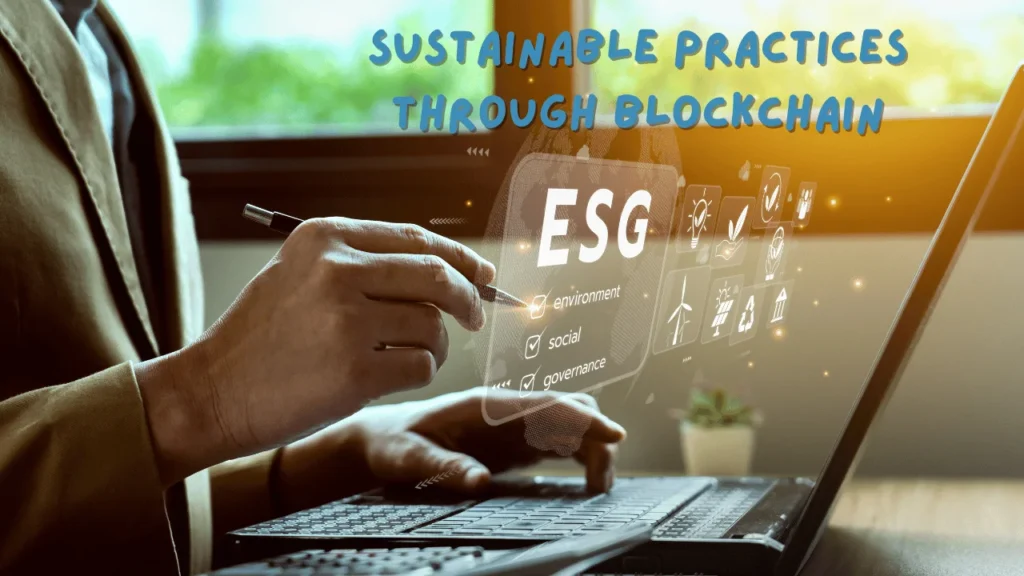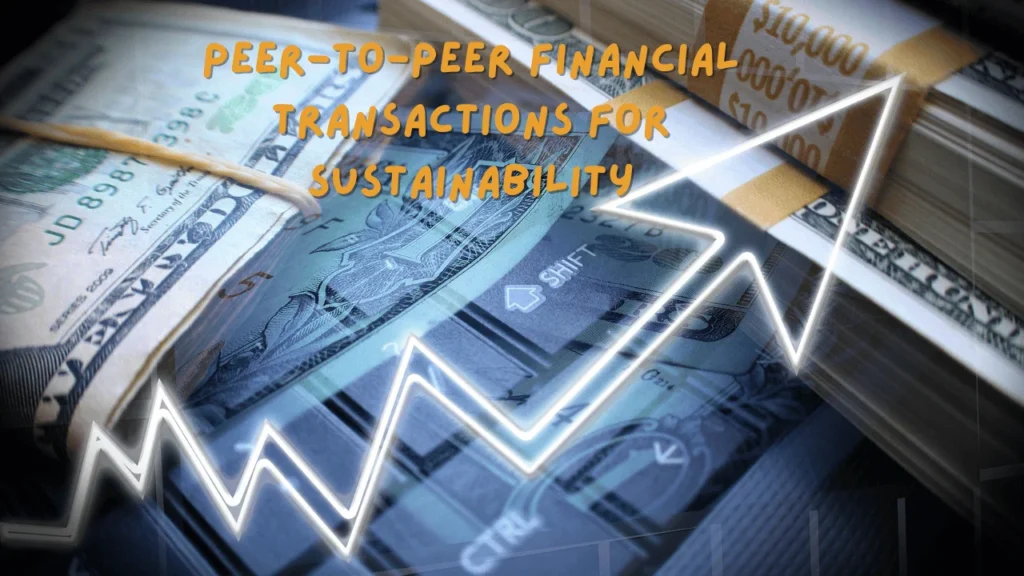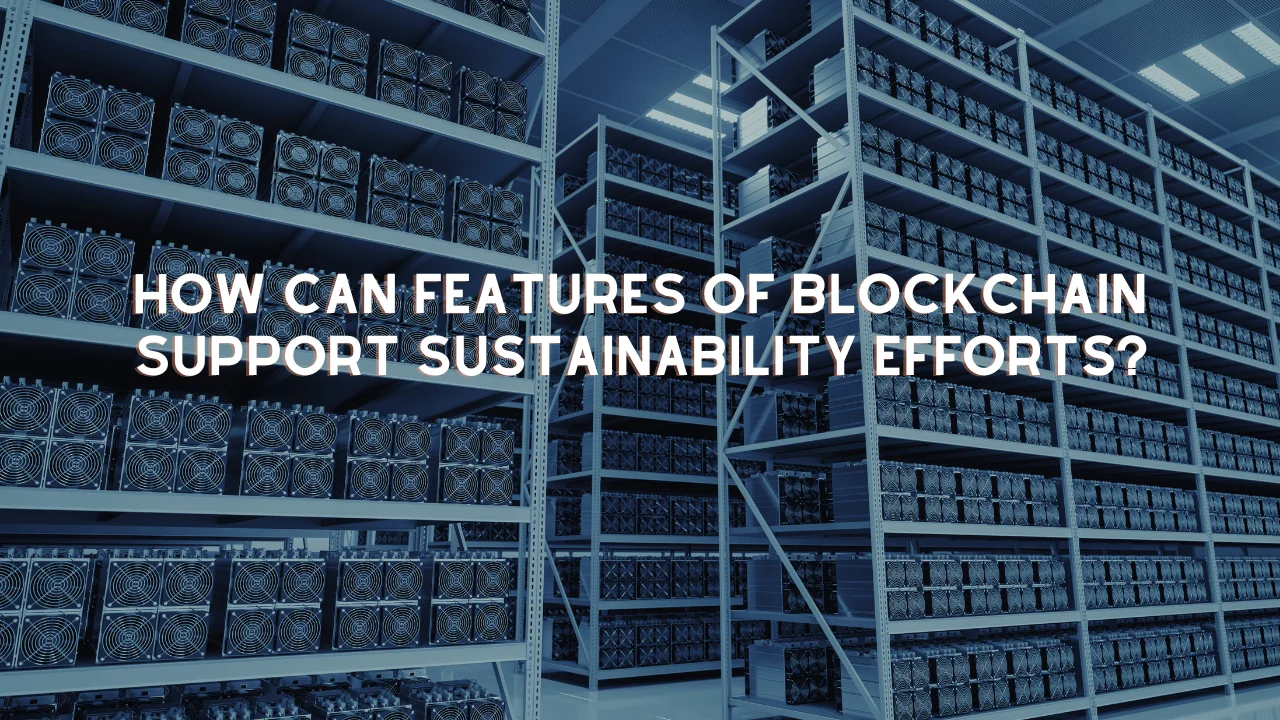In the quest to bolster sustainability initiatives, exploring innovative avenues becomes imperative. Amidst this endeavor, one pertinent query arises: How can features of blockchain support sustainability efforts? Blockchain, among the array of emerging technologies, stands out with its transformative attributes. Through its immutable ledger, decentralized structure, and efficient mechanisms, blockchain emerges as a formidable ally in advancing sustainability goals.
For Whom Is This Article Written?

Those in the innovation, environmental, policy, and business communities who are interested in learning more about how blockchain technology can be used to promote sustainability will find this article to be an invaluable resource. In this article, we will explore how blockchain technology can help you achieve your sustainability goals, whether they involve investing in green projects, reducing your environmental impact, or incorporating green practices into your operations. We hope you find this information useful.
Empowering Supply Chain Transparency
With its newfound capacity to provide unmatched transparency and traceability, blockchain technology is reshaping the supply chain management industry. This change is critical for long-term viability because it facilitates ethical sourcing verification, cuts down on fraud, and guarantees sustainable product production.
Enhancing Traceability in Supply Chains
The immutable and transparent record of transactions made possible by blockchain technology makes it possible to trace the origins of every product all the way to its final destination. In order to verify that materials are sourced ethically and that products are manufactured without causing harm to the environment or exploiting labor, this traceability is essential.
Reducing Fraud with Blockchain
Blockchain technology’s immutability makes it a powerful weapon against supply chain fraud. Securely documenting every transaction and transfer of goods, blockchain reduces the possibility of unauthorized sales and counterfeit goods, guaranteeing that consumers receive authentic, sustainably sourced products.
Blockchain for Ethical Sourcing
Blockchain technology allows businesses to confirm that their suppliers follow sustainable and ethical practices when sourcing their products. Suppliers are held more accountable and transparent through this verification process, which in turn promotes ethical labor practices and environmental protection.
Blockchain for Product Verification
Companies can give customers peace of mind knowing their products are made with sustainable materials by using blockchain technology for product verification. Customers, who are looking for more ethical and environmentally friendly products, appreciate this openness and reliability.
Sustainable Practices through Blockchain

Sustainable practices within supply chains can be verified with the help of blockchain technology. Encourages sustainable practices in all sectors by letting businesses monitor their waste output, carbon footprint, and compliance with environmental regulations.
Driving Green Finance
When it comes to green financing, blockchain technology is crucial. Blockchain is enabling innovative financial solutions for environmental initiatives and attracting substantial investments in sustainable projects by facilitating efficient and transparent transactions.
Blockchain in Green Investments
Green project investments are now easier than ever thanks to blockchain technology. It entices investors who want to make a difference in the world by offering a safe, transparent, and efficient platform for transactions. The creation and execution of eco-friendly technologies and initiatives are sped up by this flood of funding.
Crowdfunding for Environmental Projects
Crowdfunding for green initiatives is being transformed by blockchain technology. Blockchain democratizes the financing of environmental initiatives by providing a trustworthy and transparent platform for transactions, allowing individuals and organizations globally to contribute to sustainability efforts.
Peer-to-peer Financial Transactions for Sustainability

By removing middlemen and lowering transaction fees, blockchain enables peer-to-peer financial transactions. As a result of decentralization, people and communities are able to support green initiatives like conservation, renewable energy, and direct investments in sustainability projects.
Transparent Green Finance Platforms
Investing in green finance is protected by the immutability of blockchain technology. Building confidence in sustainable finance and encouraging more substantial investment in environmental initiatives, investors can track the flow of funds and the progress of projects.
Investing in Sustainability through Blockchain
Blockchain technology makes investing in sustainability more accessible and attractive. A larger variety of investors are drawn to blockchain because of its secure, transparent, and efficient transaction platforms. This leads to substantial financial backing for sustainable projects and innovations.
Revolutionizing Energy Systems
Energy systems are undergoing a transformation as a result of blockchain technology, which is improving energy efficiency and making renewable energy more accessible. Encouraging the development of sustainable energy solutions, its decentralized nature supports peer-to-peer energy trading.
Peer-to-peer Renewable Energy Trading
With blockchain technology, people can buy and sell renewable energy directly with one another, bypassing the need for a central grid. With this new development, we can become less reliant on fossil fuels and more self-sufficient in our energy production.
Decentralized Energy Systems with Blockchain
Blockchain supports the decentralization of energy systems, making them more resilient and efficient. Blockchain technology facilitates inter-user energy transactions, which lessens the strain on central grids and paves the way for the increased use of renewable energy sources.
Blockchain in Renewable Energy Adoption
Blockchain technology expedites the adoption of renewable energy sources by enabling the certification of green energy and providing incentives for its production and consumption. Blockchain technology can monitor the generation, sale, and use of renewable energy, which can encourage its adoption and facilitate the shift to a more sustainable energy future.
Enhancing Energy Efficiency through Blockchain
Blockchain technology has the potential to optimize patterns of energy consumption and increase efficiency. Blockchain technology helps with sustainability by securely recording and analyzing data about energy usage. This data can then be used to implement dynamic pricing and encourage energy-saving behaviors.
Sustainable Energy Trading Platforms
Emerging as potent tools for sustainable energy trading are blockchain-based platforms. Encouraging the expansion of green energy markets and lending support to the worldwide movement towards sustainability, they offer a safe, open, and effective platform for renewable energy trading.
Fostering a Circular Economy through Blockchain
Reducing waste and increasing resource reuse and recycling is key to sustainable development, which is why the shift to a circular economy is so important. In this shift, blockchain technology is crucial because it improves resource management in three key areas: transparency, accountability, and efficiency.
Blockchain for Material Tracking
Materials can be tracked from production to disposal and beyond with blockchain technology. With this level of granularity, both companies and customers can learn how their purchases affect the environment, which in turn promotes the use of sustainable and recyclable materials. Supporting the principles of the circular economy, blockchain ensures the efficient and sustainable utilization of resources by providing an immutable record of a material’s journey.
Promoting Recycling through Blockchain
Blockchain technology allows for more efficient management and verification of recycling initiatives. Businesses and consumers alike can be motivated to join recycling programs by means of incentive schemes made possible by this technology. One such scheme is the creation of token-based rewards for recycling activities. Both recycling rates and the growth of the market for recycled goods are boosted by this.
Minimizing Waste with Blockchain Technology
By improving product lifecycle management and supply chains, blockchain technology can drastically cut down on waste. Blockchain technology allows businesses to reduce waste and overproduction by giving precise data on product demand and lifecycle. Manufacturers are incentivized to design for durability and recyclability when products can be tracked, which in turn reduces waste.
Circular Economy Enabled by Blockchain
Blockchain technology plays a pivotal role in promoting the circular economy by providing a structure within which businesses can implement greener policies. Blockchain promotes a circular economy, where materials are reused for as long as possible, by guaranteeing the genuineness of recycled materials and making it easier to track products.
Advancing Sustainable Finance and Governance
To make sure that ESG (environmental, social, and governance) factors are considered when making decisions and to channel investments towards sustainable projects, sustainable finance and governance are essential. Through its increased openness, efficiency, and security, blockchain technology has the potential to improve these areas.
Blockchain for Green Bonds
To fund projects that have a positive impact on the environment, green bonds are an essential tool. By creating a more open and accessible process, blockchain technology can simplify the issuance and administration of green bonds. To show their investors they are serious about sustainability, issuers can record transactions on a blockchain and show them how their money is being spent in real time.
Decentralized Governance and Sustainability
Decentralized governance structures, made possible by blockchain technology, encourage openness and responsibility in the administration of sustainability programs. Organizations can automate decision-making and guarantee strict adherence to sustainability criteria with the help of smart contracts, which in turn foster trust among stakeholders.
Financial Products for Sustainability
Fintech innovations like impact investments and sustainability-linked bonds can benefit from blockchain technology. More money will go into environmentally friendly initiatives because blockchain makes it easier to issue and trade these products on an open and efficient platform.
Transparent Sustainable Governance
All decisions and transactions pertaining to sustainability projects can be recorded and verified using blockchain technology, which supports transparent governance. In order to gain the confidence of investors, regulators, and the general public—all of whom have a stake in seeing through sustainability pledges—this openness is critical.
Overcoming Challenges in Blockchain for Sustainability
Energy consumption, interoperability, and stakeholder collaboration are a few of the obstacles that must be overcome before blockchain can fully realize its promise of improving sustainability.
Reducing Blockchain Energy Consumption
Sustainability initiatives are worried about the power consumption of certain blockchain networks, especially those that use proof-of-work consensus mechanisms. A more energy-efficient consensus mechanism, such as proof-of-stake, or other blockchain innovation, is essential for reducing the impact of this problem.
Interoperability in Sustainable Blockchain Systems
Interoperability, or the ability for different blockchain systems to communicate and exchange data with one another, is crucial for blockchain to support sustainability. If we want to integrate sustainability data across platforms and industries, we need to make sure that blockchain standards and protocols are interoperable.
Stakeholder Collaboration in Blockchain Adoption
Governments, corporations, non-governmental organizations (NGOs), and the technology community must all work together for blockchain to be a success in sustainability initiatives. To promote blockchain’s use in sustainability efforts, it is essential to establish partnerships and cultivate a common understanding of its advantages and disadvantages.
Must Read: How is Blockchain Different from Traditional Database Models?
FAQs
How does blockchain support sustainable supply chains?
With blockchain technology, supply chains are more transparent and traceable, which helps with reducing fraud and waste while also verifying ethical sourcing.
Can blockchain technology improve recycling efforts?
Yes, blockchain technology has the potential to revolutionize recycling by facilitating the development of open, incentive-based systems that both validate and incentivize recycling efforts.
What role does blockchain play in green finance?
An efficient and transparent platform for investing in and managing environmental projects, like conservation efforts or renewable energy, is what blockchain does to enable green finance.
How does blockchain technology promote energy efficiency?
Blockchain technology facilitates decentralized, trustless energy trading between users and allows for the optimization of energy consumption patterns via the secure and transparent management of data.
What are the main challenges facing blockchain in sustainability?
Major obstacles include finding ways to lower the energy consumption of certain blockchain systems, making sure that different blockchain platforms can communicate with each other, and encouraging stakeholders to work together to boost adoption.
Conclusion
Finally, blockchain technology has tremendous promise for bolstering sustainability efforts in various sectors. How can features of blockchain support sustainability efforts? Blockchain is a potent instrument for advancing sustainable practices; it can drive green finance, improve supply chain transparency, and transform energy systems. However, issues like energy consumption and guaranteeing interoperability must be addressed before its full potential can be realized. We can use blockchain technology to build a better, more equitable world if we think outside the box and work together. A future that is both greener and more resilient is within reach as long as we keep investigating and developing blockchain’s sustainability applications.

Brandy Stewart, an enchanting wordsmith and seasoned blogger, weaves compelling narratives that transport readers to uncharted territories. Infused with perceptive viewpoints and dynamic storytelling, Doris exhibits a command of language that enthralls both hearts and minds, leaving a lasting mark on the literary panorama.

